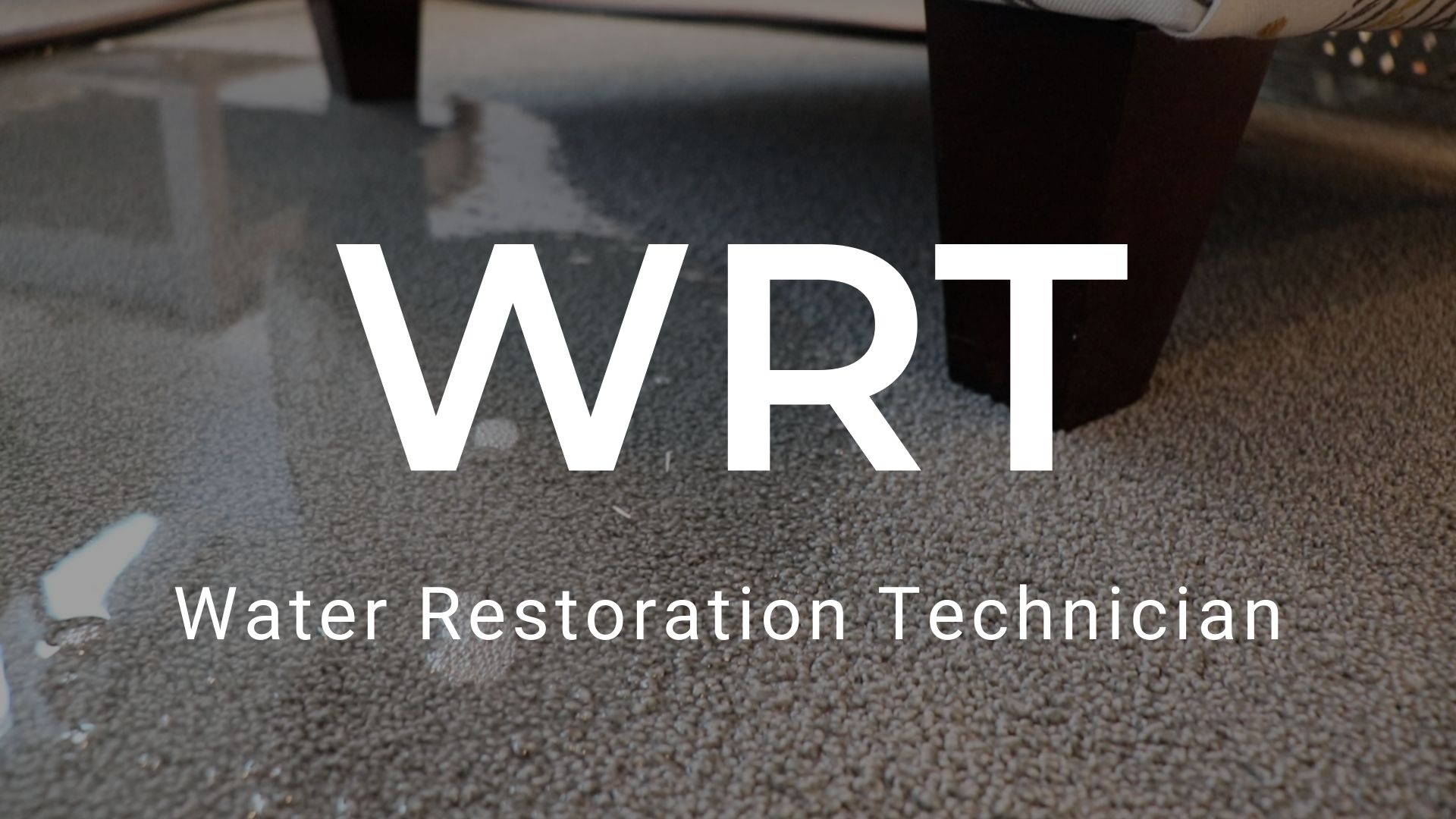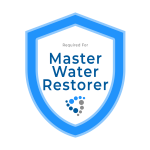IICRC WRT/ASD Combo Course
Earn both your WRT and ASD Certifications In One Week!
The IICRC WRT/ASD combo course will give you a steady foundation combining classroom instruction and drying a structure affected by water damage. In this combo course, the student will earn both the Water Restoration Technician (WRT) certification and the Applied Structural Drying (ASD) certification. These certifications will give the student hands on instruction and knowledge while they dry out a water damaged building.
- Learn water damage restoration in a hands on setting
- Understand the industry standard (IICRC S500)
- Earn both IICRC WRT and ASD certifications!
Earn both certifications after successfully passing both exams! Please note there are two exams that must be completed in this combo course.
Cost: $1,395/person + $160 exam fees ($80 for each exam, Paid to the IICRC)
Save 10% when you register 4 or more students!
Industry Leading Rescheduling Policy
Our industry-leading cancellation and rescheduling policy is simple. You can reschedule for free anytime before class begins.
Should I take the WRT Course?
The IICRC WRT certification is often the first class students take in their restoration industry education. The Water Restoration Technician course will give you the foundation of mitigation and water damage restoration. Anyone can take the WRT class, there are no prerequisites or experience required!
After taking this course, students will have the opportunity to take the IICRC exam. After passing the exam, the student will receive their certification. Our WRT course prepares students for the exam following class and, more importantly, for real-world applications.
IICRC WRT is Required for the Master Water Restorer Designation
The Water Restoration Technician is a required certification to earn the IICRC Master Water Restorer designation.
What you will learn in the Applied Structural Drying & Water Restoration Technician Combo Course
Introduction to the IICRC & S500
- Intro to the Institute of Inspection Cleaning & Restoration Certification
- What is the IICRC
- IICRC S500 Standard for Professional Water Damage Restoration
- ANSI Accredited
Safety
- Personal Protective Equipment (PPE)
- Immunizations
- Equipment Safety
- Identifying potential on-the-job hazards
- Water Damage specific hazards
Water Damage Mitigation (Preventing Further Damage)
- Initial assessment
- Locating the source of water
- Protecting structure, furniture and other contents
- Stopping secondary damage
Psychrometry
- Science of drying
- Psychrometric chart
- Dew Point
- Humidity Ration (GPP)
- Relative Humidity
- Vapor Pressure
- Drying Pie (Humidity, Airflow, Temperature)
Developing a Scope
What’s wet?
- Evaluation & Preparation
- Determining migration of water
- Evaluating class of water loss
- Evaluating category of water loss
- Building materials: Carpet, pad, flooring, sub-flooring, framing, drywall etc.
- Drying methods
- Determine a dry standard and a dry goal
Water Extraction
- Extraction Tools
- Portable extractors and truck-mount extractors
- Extraction wands
- Extracting standing water
- Determining how many gallons of water are present
- Disposal
Measuring and Monitoring
How wet is it?
- Moisture Detection & Inspections Tools
- Moisture Meters and Sensors
- Infrared cameras
- Moisture levels in materials and in the air
- Types of moisture meters and how to use them
- Psychrometry – The science of drying
Installing Equipment
Is it drying?
- Types of air movers, how they are used, and determining how many are needed
- Types of dehumidifiers, how they are used, and determining how many are needed
- Monitoring the drying progress
- Reconfiguring and adjusting equipment to reach drying goals
Microbiological
- Antimicrobials and biocides
- Stopping cross contamination
- Containments
Return to Pre-Loss Condition
Is it dry?
- Repairs
- Cleaning
- Resetting contents
Hands On Drying
- Preparation for safety
- Initial assessment
- Water extraction using different tools
- Calculating and setting equipment
- Drying different building materials and assemblies
- Psychrometric conditions
- Daily monitoring using moisture meters
- Documentation
- Completing the dry out process
There are no prerequisites to take the WRT/ASD combo course. Anyone can join the class!
Yes, students will take 2 exams during the course. The WRT exam and the ASD exam. There is a separate $80 exam fee for each exam. Exam fees are paid directly to the IICRC.
Yes, after completing the WRT/ASD combo course and passing both exams, you will earn both the WRT and ASD certifications.
No, the WRT/ASD combo course cannot be taken online, it must be taken at the LearnToRestore.com Training Center in Salt Lake City, Utah. Part of the course is the hands-on portion of drying a real project in our Flood House.
If you want to take the WRT and ASD courses separately, you can complete the WRT course online before attending an in-person ASD course.
If you have additional questions about any of our courses, check out our Help Center or contact us!
After attending the course, students can take the WRT exam. Upon passing the exam, the IICRC will issue the student a certification, and mail a certificate for you to display! Students are able to take the exam after attending a WRT course with LearnToRestore.com.
How much is the IICRC WRT exam fee?
The WRT exam fee is $80.
Can I use notes on the exam?
The IICRC WRT exam is a closed book and closed notes exam, with the exception of a psychrometric chart and formula sheets. Both of these will be discusses and taught during class!
When do I take the WRT exam?
Students attending the live-stream online WRT course will complete the exam online after the class through the IICRC exam portal. You have 45-days to complete the exam after class ends.
Students attending the in-person course will complete the exam on the last day of class.
How many questions is the IICRC WRT exam?
The Water Restoration Technician exam is 84 multiple choice questions.
Can I retake the WRT exam?
You have three attempts to pass the WRT exam. Each exam attempt has an $80 exam fee. If you fail the third attempt, you will need to take the WRT class again before an additional exam retake. If you fail the exam three times and need to take the class again, we will put you in a refresher class for free!
Note: LearnToRestore.com is an IICRC-approved school and is approved to teach the Applied Structural Drying class. We are building our Flood House to hold the ASD class. We are awaiting IICRC approval for the Flood House to hold classes. The information on this page is for information about the ASD class, and when we receive IICRC approval for our Flood House, our schedule will open to register for classes!
Classes You May Also Like
Remember, the longer it sits the worse it gets!™
The IICRC water damage training course is based on the IICRC S500 Standard for Professional Water Damage Restoration. The S500 is the industry standard and is used by restorers, insurance companies, attorneys, and anyone working in the water damage restoration industry!
Get the IICRC S500 (Use code “REME” when checking out!)
Fun Fact: Darren Foote is a member of the IICRC S500 Consensus Body, Chairman of the WRT class Technical Advisory Committee, and on the IICRC Board of Directors!
Earning an IICRC WRT Certification
Students who attend an IICRC course and pass the corresponding exam will earn their certification. This establishes you as a Certified Technician.
The water damage restoration class is great for anyone in the restoration, cleaning and insurance repair industries. Contractors, insurance professionals, TPA’s, property management, facilities engineers, restoration technicians, project managers and anyone can take this WRT class to become confident in their ability to understand the restorative drying process!
These classes are an in-person or live-stream technical course that will give students the understanding of how to properly and efficiently dry out a building with water damage. This course covers how to determine what building materials can be saved and dried and what needs to be removed and replaced, level of contamination in water, potential rate of evaporation, how to determine equipment needs, psychrometry, moisture meters and much more.







